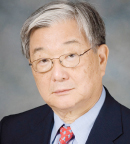
Waun Ki Hong, MD, FACP, FASCO
Waun Ki Hong, MD, FACP, FASCO, led numerous clinical trials showing that cisplatin-based chemotherapy and radiotherapy could effectively treat patients with cancer of the larynx while sparing their voice box. This seminal work also served as a model for organ-preservation strategies in many other cancers. Dr. Hong’s many practice-changing contributions improved the lives of countless patients with head and neck cancers and helped pave the way for the current era of biomarker-driven therapies. Dr. Hong died on January 2, 2019. He was 76.
A Childhood Disrupted by War
Dr. Hong was born in a small village on the outskirts of Seoul, South Korea. His early life in the tight-knit rural community was thrown into chaos in 1950, with the outbreak of the Korean War. As an 8-year-old, Dr. Hong recalled North Korean refugees filling the streets near his family home. Shortly before the war, he had another childhood trauma, a near-fatal bout with bacterial peritonitis, which proved fortuitous—the doctors who saved his life inspired his decision to pursue a career in medicine.
Dr. Hong completed his premed work at the Yonsei University College of Engineering and Science in Seoul before entering Yonsei University School of Medicine, where he received his medical degree in 1967. To fulfill his compulsory national service, Dr. Hong served as a flight surgeon for the Korean Air Force during the Vietnam War, where he cared for wounded soldiers being transported from Vietnam to hospitals in Korea, an experience he described as devastating.
A Golden Opportunity
In 1970, Dr. Hong had what he later described as a “golden opportunity” to become a rotating intern at Bronx/Lebanon Hospital in New York. After his training, he moved to the Veterans Affairs (VA) Medical Center in Boston, which would prove career-changing. He told The ASCO Post he saw so many older veterans there with head and neck cancers—diseases with no effective treatments at the time—that it inspired him to pursue a career in oncology.
After completing his residency in 1973, Dr. Hong was accepted into a medical oncology fellowship at Memorial Sloan Kettering Cancer Center in New York, another valuable step in his maturing career. Following his fellowship, he returned to the Boston VA Medical Center, serving as Chief of Medical Oncology.
“It was an incredibly rewarding time. I was the only trained medical oncologist, and not only did I have to care for many patients, but I also taught medical students who wanted to pursue a career in oncology as well as the Center’s house staff,” Dr. Hong said in an interview.
Seminal Clinical Trials
The Boston VA was where Dr. Hong conducted his research in combination therapies that would prove to be a less invasive way to treat laryngeal cancers, sparing patients their voice box. In 1991, he and coauthor Gregory Wolf, MD, published their findings in TheNew England Journal of Medicine, launching a practice-changing paradigm in organ-preservation therapies.
Largely due to his pioneering work in head and neck cancer, The University of Texas MD Anderson Cancer Center in Houston offered Dr. Hong a position as Chief of the Section of Head and Neck Oncology, where he centered his priorities on translational research. He also continued his chemoprevention research, leading the National Cancer Institute’s P01 Program Project: Biology and Chemoprevention of Head and Neck Cancer.
Dr. Hong’s many practice-changing contributions improved the lives of countless patients with head and neck cancers and helped pave the way for the current era of biomarker-driven therapies.—
Tweet this quote
Dr. Hong’s long career at MD Anderson was highlighted by numerous clinical and research achievements that improved outcomes, reduced therapy-induced morbidities, and improved quality of life for patients with cancer. In 2001, Dr. Hong became Head of the Division of Cancer Medicine at MD Anderson, and he continued in that role until his retirement in 2014.
During that period, he reveled in his teaching and mentoring activities, which he felt were vital to keeping the field moving forward.Dr. Hong was proud of his heritage, giving back by way of training more than 60 young oncology fellows from Korea, with about 20 of them now serving as chairs or directors of cancer centers in Korea.
A Lifetime of Achievements
Dr. Hong was a long-time active member of ASCO, serving on the Board of Directors from 2006 to 2009, as Chair of the Conquer Cancer Grants Selection Committee, and as a member of the Cancer Education Committee, among other activities. In 2000, he received ASCO’s David A. Karnofsky Award and Lecture, and in 2016, he was presented with ASCO’s Special Recognition Award.
He was a Past President of the American Association of Cancer Research (AACR) and is the namesake for the AACR Waun Ki Hong Award for Outstanding Achievement in Translational and Clinical Cancer Research given to young investigators. Over the course of his career, Dr. Hong also held a number of high-level advisory positions related to public health policy.
His many colleagues in the oncology community remember Dr. Hong as an enthusiastic and committed leader who put compassionate care above all else. He told The ASCO Post, “To this day, I get e-mails from laryngeal cancer survivors, thanking me.” There is perhaps no greater tribute for an oncologist than heartfelt thanks from patients. ■

